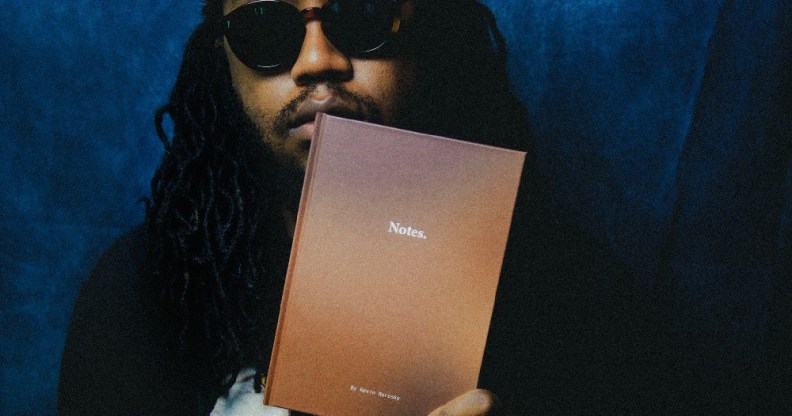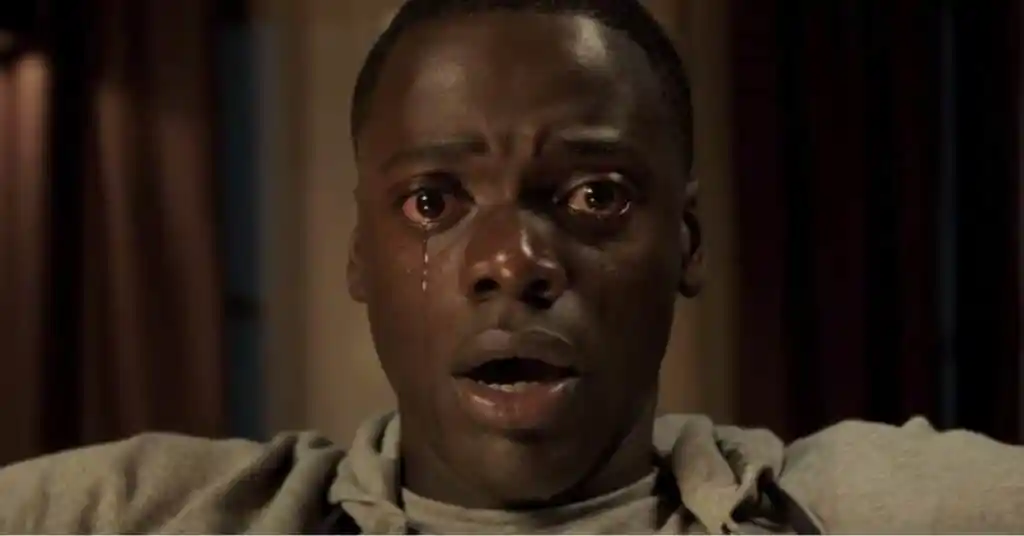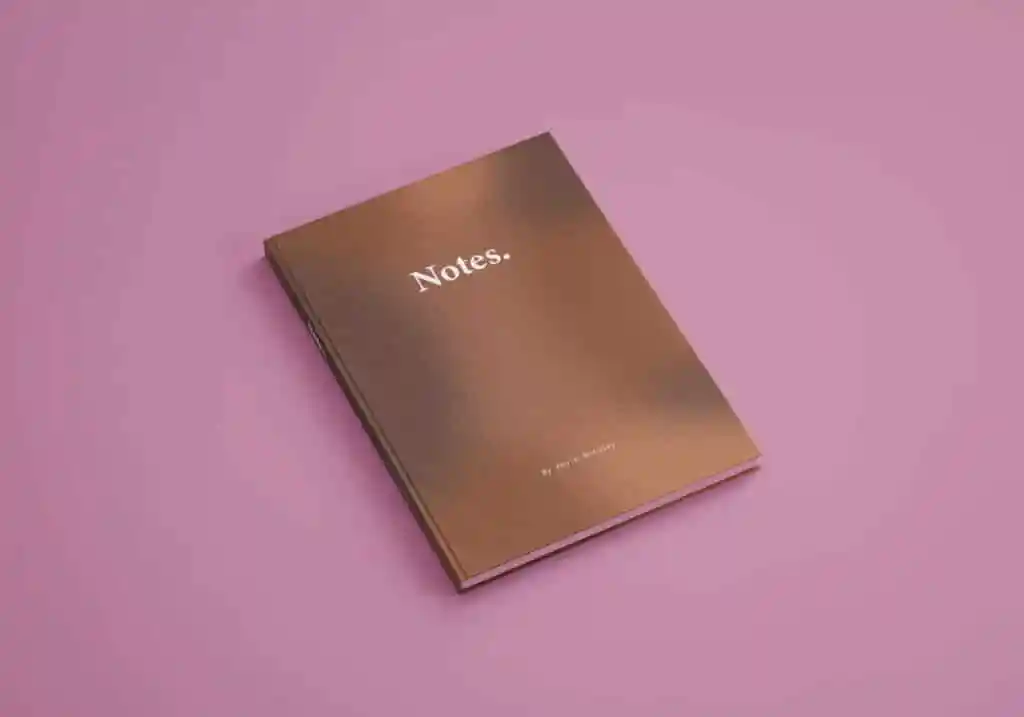Director and writer Kevin Morosky on writing a queer, Black love story for the ages

Kevin Morosky. (Supplied)
PinkNews talks to creative and author Kevin Morosky about his queer, Black, south London, Virgo love story.
The world needs more queer Black love stories. In real life, they’re everywhere, but for the most part they’re absent from our screens, our theatres, our bookshops.
The internet and social media helps us share our experiences, but there’s still resistance from those in charge of the old forms. Films like Moonlight are notable because they’re the exception – for the most part, gatekeeping stops our stories from being told on the biggest, loudest platforms.
Kevin Morosky is one person who knows a lot about this. A director, creative, writer and “whole Virgo”, he decided it was high time for a book of poems – or “cut and paste prose”, as he calls his – that represented his perspective: Black, queer and distinctly South London.
The book, Notes, tells a love story through intimate vignettes: starting with the heady excitement of a new fling; ending with a mix of heartbreak optimism. An accompanying series of films echo the feeling of stolen memories, bolstered by narration from Russell Tovey, Susan Wokoma, Kelechi Okafor and others.
PinkNews: Why did you write this book?
Kevin Morosky: It’s just pure heartbreak and trying to make sense of it. I’m a whole Virgo, so I have to analyse everything. It’s just a therapeutic exercise.
In terms of the mission behind it – there’s not poetry – I’m not going to say there’s none out there – but there’s nothing specifically from a very Black, brown, South London, Virgo perspective, so I wanted to put that into the world.
And what is lovely actually, on Friday [publication day] I got a message from a young man who’s getting married in a month. The last film that went out was read by Russell Tovey, and he saw it, and he said to me: “I’ve ordered your book. We had nothing to read at the wedding, because we couldn’t find anything that represented us. And then we heard your poem, and we’re going to read it at our wedding.”
It made me really emotional. Friday was quite a stressful day, not for any negative reasons, but when you’re releasing such a personal thing, you’re like, “Here are my feelings and this is how I feel about love” and putting it out into the world, you’re just like, “Am I crazy? Should I be doing this?”.
And then you get messages like that – it confirms why you’re doing what you’re doing. To put representation out there. It’s not necessarily about selling 100 million books, it’s about that one person seeing it and being like, cool, I feel seen. And then they pass that on.
Getting messages like that must really vindicate all the effort you went to to put this book out there.
One hundred per cent. I got teary-eyed. There’s another film that I released a couple of years ago, but it went a little bit viral last year. It’s called 500 Pennies, and it’s about a free slave that lived in the Lake District.
I was there on one of the boat tours. And very casually, the guy who’s doing the tour was like, “Over there, they used to own slaves, and they would just throw the bodies into Lake Windermere”. It just just rolled off of his tongue. It was traumatic, it was really upsetting, because I’ve been going to the Lakes for years.
It led to me researching the story. I found the grave of this free slave, made a film around it, and, and as I said, last year, it went viral. And then I got a message. I don’t know if it was the same guy, but he was like, “I work on those boats. And we often say that and have never thought about how traumatic that must be to hear, how disrespectful it sounds. We’re going to change the policy on the boats and, and make sure that we discuss those things in a more thoughtful kind of way.” That is the basis of all of the work and all of the art that I produce, it’s about trying to change things and take up space in a way that impacts positively.
You made a really good point on Twitter about how Notes is a project that isn’t about tension, and how gatekeeping means that a lot of Black projects that make it out are about trauma. What was the process like of just getting something like this out?
There was a space and time where we needed to talk about the horrible things that this country and other countries and society has done to Black and brown people, to queer people, to trans people. They needed to be spoken about. But then there’s that tipping point where now, it just feels like entertainment sometimes. We needed Get Out, because that was a whole metaphor and a whole conversation that needed to happen. But what needed to happen after Get Out was another film that takes the conversation further, which I think Jordan Peele did with with Us.
But then there’s stuff that has come out more recently that [ended up repeating what Get Out did]. We’re going to talk about slavery, we’re gonna do this and that, and it’s like, we’ve had that conversation. And those conversations need to happen, but predominantly it’s within middle class white homes where they need to do self-education, because it’s not my responsibility. It’s not your responsibility.

Daniel Kaluuya in Jordan Peele’s Get Out. (Universal)
If you want to dedicate time to do that, then cool. There are moments where we will have to do that, whether it’s just because you want to or wherever it’s because you exist within a blended family as I do. Sometimes I do have to have those conversations because those people are part of my family and I’m going to put that time in. But to the public, I don’t feel like that’s my responsibility.
I do however, feel like it’s my responsibility to share all of my existence and all of my all of my emotions, so not just when I’m scared or when I’m being attacked. It’s also about when I am happy in love, when I’m heartbroken, when I find love after that, because that’s how you start to humanise us. You start to step back and stop talking about my skin tone – which is very important, on my sexuality – which is very important, but you start to realise there’s a whole existence behind me, rather than trying to put me in that gay box, or that Black gay box. I’m not box shaped, I’m human shaped.
Did putting so much of yourself on those pages make you nervous?
No, because I’m tired of queer people dying. I’m tired of trans men and women being murdered. And when I balance that against my own insecurities, if I could save a life, then boom, I’m gonna save a life. And that’s how I got to it. Also I’m a Virgo, I’m really bad at small talk, so I’m going to tell you everything, I’m all for the details. And they were really happy moments. There were s**tty moments, but also really, really happy moments for me that made me understand what it is I want from future relationships.
If I was a baby gay and got this book, I think that I would have been like, “Oh great, we do have love stories.” No tea, no shade to anyone that loves not being in a relationship – let’s all do what we want to do – but I love the idea that there is an option of love. And this is how, sometimes, love is and what it can kind of lead to, as well as all the fun and the freedoms that we have as gay and queer men, specifically in this moment.
Notes is available to buy now.

Kevin Morosky’s Notes. (Supplied)

